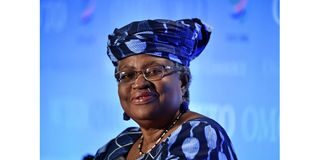Let’s to choose to challenge inequalities

Dr Ngozi Okonjo-Iweala who was confirmed as the first woman and first African leader of the World Trade Organization last month.
What you need to know:
- Girls must grow up knowing that they can be presidents, engineers, CEOs, and we as society must learn to be comfortable with women working in traditionally male-dominated professions.
- We must challenge cultural practices that rob women and girls of their potential, freedom and future either through circumcision or early marriages
Monday, March 8, is International Women’s Day. It is not only a day to celebrate women, it is also a day to reflect—as a society—on the place of women and girls in humanity.
The theme for this year is #ChooseToChallenge. A provocative theme that compels us to look inwardly and challenge certain societal norms and cultures because “From challenge, comes change”. In this regard, I have a few things on my list we must #ChooseToChallenge. We must challenge gender inequalities that seem to follow women everywhere.
In politics, for instance, only 57 out of the 193 countries are members of the United Nations have ever had a woman at the highest office, according to Women and Leadership, a new book by former prime minister of Australia Julia Gillard and the new WTO Director-General Ngozi Okonjo-Iweala.
This means that 70 per cent of countries have always had a male leader. If we include the women who have at least served in acting capacity, that percentage increases to 72. It means that over 60 per cent of the world’s nations have never had a woman at the helm, not even as temporary leader.
It is 2021, we must find ways to include more women in political leadership, not just at grassroots level to help the men get elected, but at the decision-making table. We must challenge the economic empowerment gap between men and women.
Global Gender Gap Index
Since 2006, the World Economic Forum publishes the Global Gender Gap Index that measures the extent of gender-based gaps across four main areas; political empowerment, economic participation and opportunity, educational attainment, health and survival.
The 2020 Global Gender Gap Index found that, globally, for every dollar a man earns, a woman earns 63 cents. This gap is not uncommon, where women earn significantly lower than men for the same role, and in some cases where women have more experience and qualifications. We must close this pay gap and stop victimising women for negotiating better terms and wages for themselves.
We must challenge stereotypes that define how people should act and behave based on their gender. We could do this by raising our daughters and sons to know that there are no roles, jobs and opportunities that are a reserve of one gender. Girls must grow up knowing that they can be presidents, engineers, CEOs, and we as society must learn to be comfortable with women working in traditionally male-dominated professions.
In the same vein, we must challenge cultural practices that rob women and girls of their potential, freedom and future either through circumcision or early marriages. Add to that policies that police women’s bodies.
Lastly, may I suggest we ban the term “male-dominated,” as it gives women and girls the false impression that some careers are unattainable and the preserve of men. Let’s replace it with “high-potential”.





